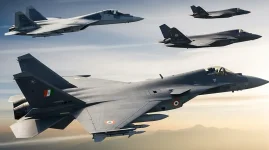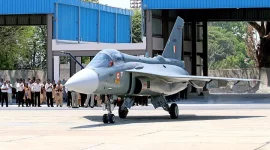The Indian Air Force (IAF) is now expected to receive its first batch of the indigenous Tejas Mk1A fighter jets by March 2026. This new timeline marks a significant two-year gap since the first production model successfully completed its maiden flight.
According to reports, the schedule has been impacted by persistent supply chain hurdles, chiefly the delayed delivery of crucial F404 engines from the United States, as well as setbacks in weapons integration trials.
The first Tejas Mk1A in its production configuration, designated LA-5033, conducted a successful 18-minute test flight from a Hindustan Aeronautics Limited (HAL) facility in Bengaluru on March 28, 2024.
This aircraft represents a substantial upgrade over the existing Tejas variant, featuring an advanced AESA radar, new electronic warfare systems, and the capability to fire a wider range of precision-guided weapons for air-to-air combat and ground-strike missions.
The primary bottleneck in the production schedule is the supply of F404-IN20 engines from General Electric (GE) Aerospace. GE has faced significant challenges in restarting its production line, which had reportedly been dormant for several years before India placed its order.
Shipments that were originally anticipated in 2023 only began arriving in 2025, with very few engines delivered to HAL so far. These more powerful engines are essential for supporting the Tejas Mk1A's enhanced thrust requirements.
Further delays have been attributed to challenges in integrating and testing the aircraft's advanced weapons package.
Reports indicate that trials for the indigenous Astra Mk1 beyond-visual-range missile encountered software-related issues that required refinement. These software upgrades are necessary to ensure the missile functions seamlessly with the new Israeli-made electronic scanning radar.
According to HAL Chairman and Managing Director D.K. Sunil, the company expects to deliver at least six Tejas Mk1A aircraft to the IAF by the end of the fiscal year in March 2026.
To accelerate manufacturing, HAL has inaugurated a new, third assembly line in Nashik. This expansion is intended to help ramp up total annual production to 16 aircraft and eventually higher, provided the engine supply from GE becomes stable.
This delivery postponement comes at a critical time for the IAF, which is currently grappling with a squadron strength of around 30, against a sanctioned requirement of 42.
The 2021 contract for 83 Tejas Mk1A jets, valued at ₹48,000 crore, is a key part of the national defence strategy to replace the ageing MiG-21 fleet.
A more recent order for an additional 97 aircraft, valued at approximately ₹67,000 crore, will further augment the fleet, though its deliveries are not slated to begin until 2027-28.







